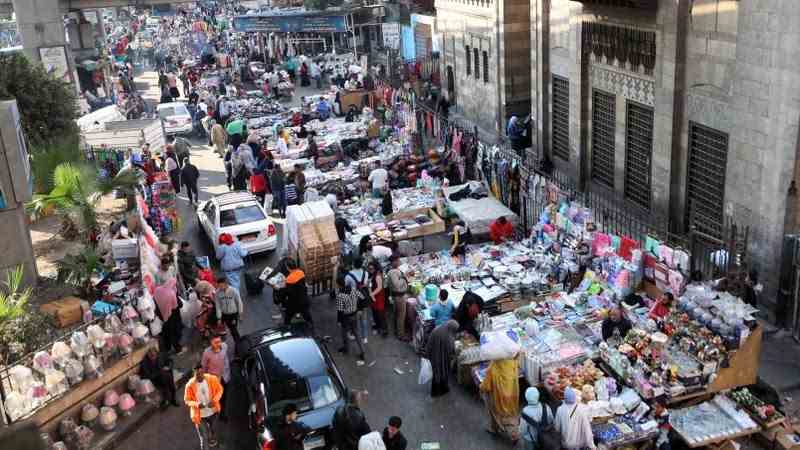Egypt's annual inflation leaps again and lays bare country's deepening woes

Egypt's annual inflation rate climbed to 31.9 per cent in February, from 25.8 per cent in January, a higher-than-expected increase that lays bare the country's deepening economic woes. The figure, reported by the state statistics agency Capmas on Thursday, is the highest in more than five years, driven by elevated food prices which soared 14 per cent month on month and by about 62 per cent annually.
The reading was higher than EFG Hermes' projected 27 per cent increase and above the 27.7 per cent estimate by Naeem Brokerage. The sharp rise in food prices is “a reflection of supply shortages, as well as speculative activities by traders, rather than being purely an impact of a weakening Egyptian pound”, EFG Hermes, an investment bank, said in a note on Thursday.
The prices of poultry, now a common substitute for the much more expensive red meat, rose 37.7 per cent a month and by about 70 per cent in the past two months. Non-food inflation rose 2.1 per cent month on month and 18.1 per cent annually.
The sharp increase in inflation follows the slide of the Egyptian pound by about 50 per cent since March last year and coincides with a persistent shortage of foreign currency that led to long delays in getting imports into the country, something that has, in turn, hit local industries badly.
The government says the fallout from the Russia-Ukraine war is to entirely blame for the country's economic woes, a contention that is disputed by critics who attribute the crisis mostly to excessive borrowing and spending on multibillion dollar national projects.
The economic crisis has prompted the government to embrace measures to shield the most vulnerable Egyptians against the price hikes. Last week, it decreed an increase in pensions, government employees' salaries and the size of annual income exempted from tax.
It has also repeatedly put off removing subsidies on domestic electricity and extended the coverage of social and economic support programs for millions of the poorest Egyptians.
Inflation in the Arab world's third-largest economy is certain to go up in March after last week's move to raise fuel prices and is expected to prompt further rates increases from the Central Bank of Egypt.
The banking regulator raised interest rates by 800 basis points last year as inflation soared. It maintained its rates earlier this year after the US Federal Reserve increased its own to their highest since 2008.
“Despite being mostly a reflection of supply disruptions, we still think the last two inflation readings are likely to prompt the CBE to resume its tightening cycle,” EFG Hermes said. “Inflation has only significantly increased from those levels and, with elevated inflation expectations, we think further tightening is warranted.”
The investment bank is projecting increases of 200 bps in the first half of 2023, but said there is “upside risk” to its forecast, in light of the significant increase in inflation over the past two months.
Naeem Brokerage expects interest rates increases of 200 bps to 300 bps in the central bank's next Monetary Policy Committee meeting, which it said could be preceded by an emergency meeting.
Previous Story
- Why consumer-goods manufacturers are finding it difficult to...
- US inflation falls again to ease pressure on...
- US hiring remains resilient as Federal Reserve grapples...
- Turkey inflation slows the most since 1995 ahead...
- Lebanon inflation rate increases 189% in first 11...
- UK inflation falls from 41-year high as fuel...
- Payrolls and wages blow past expectations, flying in...
- Asian shares mixed as investors eye Tokyo inflation...